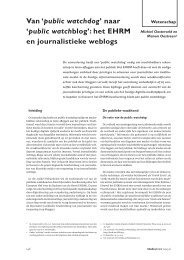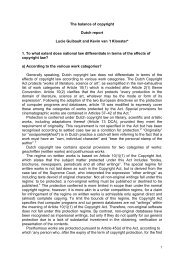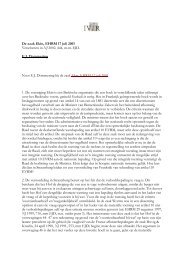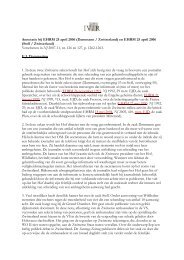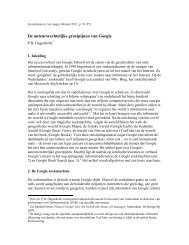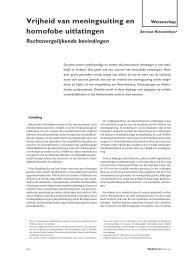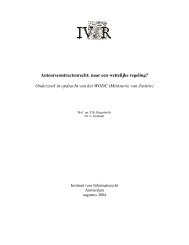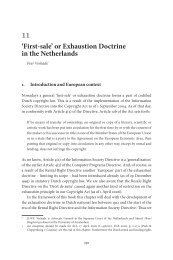ADAPTING COPYRIGHT TO THE INFORMATION ... - IViR
ADAPTING COPYRIGHT TO THE INFORMATION ... - IViR
ADAPTING COPYRIGHT TO THE INFORMATION ... - IViR
Create successful ePaper yourself
Turn your PDF publications into a flip-book with our unique Google optimized e-Paper software.
Arguably, the `legal security' argument carries relatively little weight in respect of digital<br />
distribution of works. The digital environment facilitates the identification of<br />
disseminated works - and their copyright status. Status information, possibly including<br />
licensing conditions, can be carried by the work itself in so-called permission headers or<br />
software envelopes. 34<br />
The true value of all these arguments, as they relate to the digital networked environment,<br />
will become clear only after generally accepted trade customs have developed. If<br />
the present, rather anarchistic etiquette of the Internet would become the prevailing norm<br />
on the information superhighway, the commerce theory and the legal security argument<br />
would make a strong case in favour of applying the exhaustion principle in the digital<br />
networked environment. On the other hand, if the superhighway were to conform to the<br />
emerging trade customs of the electronic publishing industry, these arguments would<br />
carry little weight.<br />
Not surprisingly, rightholders are adamantly opposed to the idea of applying the<br />
exhaustion principle to the digital network. Thus, both the U.S. White Paper and the EC<br />
Green Paper flatly reject any application of the exhaustion principle to the<br />
superhighway. 35<br />
4.2 Exhaustion of the broadcasting right<br />
Most copyright laws in the European Union confine the exhaustion rule to acts of<br />
physical distribution. Germany is a notable exception; according to the German Supreme<br />
Court, the rule is a fundamental principle of copyright law, that applies to all<br />
exploitation rights. Accordingly, the (immaterial) broadcasting right is exhausted by<br />
secondary cable distribution under certain specific circumstances. In its decision of 7<br />
November 1980 (Gema/Deutsche Bundespost) 36 , the Bundesgerichtshof decided that<br />
copyright owners may not exercise their broadcasting rights in respect of cable<br />
transmissions in `shadow areas', where the initial hertzian broadcast cannot be received<br />
because of physical impediments. The decision of the Bundesgerichtshof has been<br />
harshly criticized in German literature; many scholars believe it to be in conflict with<br />
article 11bis of the Berne Convention.<br />
On the European level, the Court of Justice has refused to apply the well-established<br />
European exhaustion rule to secondary cable transmissions. In its two decisions in the Le<br />
Boucher case 37 , the Court considered that the broadcasting right of a film producer was<br />
not exhausted by the licensed primary broadcast in a neighbouring Member State. The<br />
rightholder could therefore legitimately oppose the unauthorized retransmission of the<br />
film via cable networks. The Court of Justice observed that `the right of a copyright<br />
34 See supra note 8.<br />
35 Report (White Paper) of the Working Group on Intellectual Property Rights, Intellectual Property and<br />
the National Information Infrastructure, Washington D.C., 1995, 95; EC Green Paper, supra note 19,<br />
48.<br />
36 German Supreme Court (Bundesgerichtshof), Judgement of 7 November 1980 (Gema/Deutsche<br />
Bundespost), GRUR 1981, 413.<br />
37 European Court of Justice, Judgement of 18 March 1980, Case 62/79 (Coditel v. Ciné-Vog Films),<br />
RIDA 105 (1980), 156; European Court of Justice, Judgement of 6 October 1982, Case 262/81 (Coditel<br />
v. Ciné-Vog Films II), RIDA 115 (1983), 120.



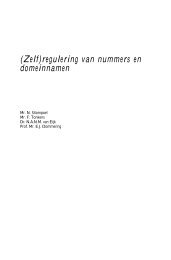
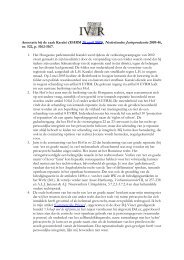
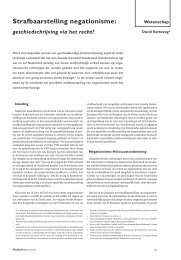
![Legal Opinion of Professor Egbert Dommering [1] concerning ... - IViR](https://img.yumpu.com/23603085/1/184x260/legal-opinion-of-professor-egbert-dommering-1-concerning-ivir.jpg?quality=85)
